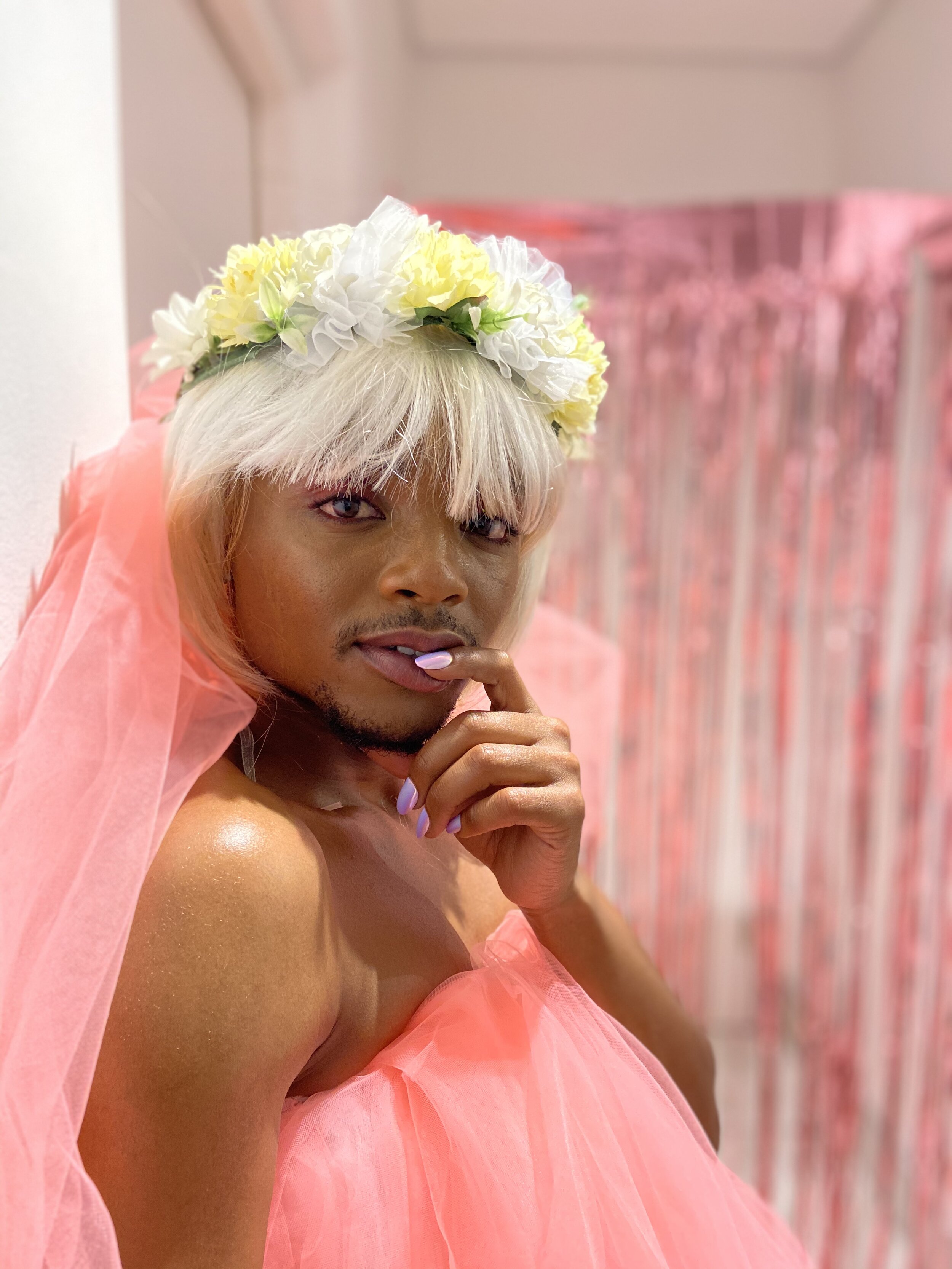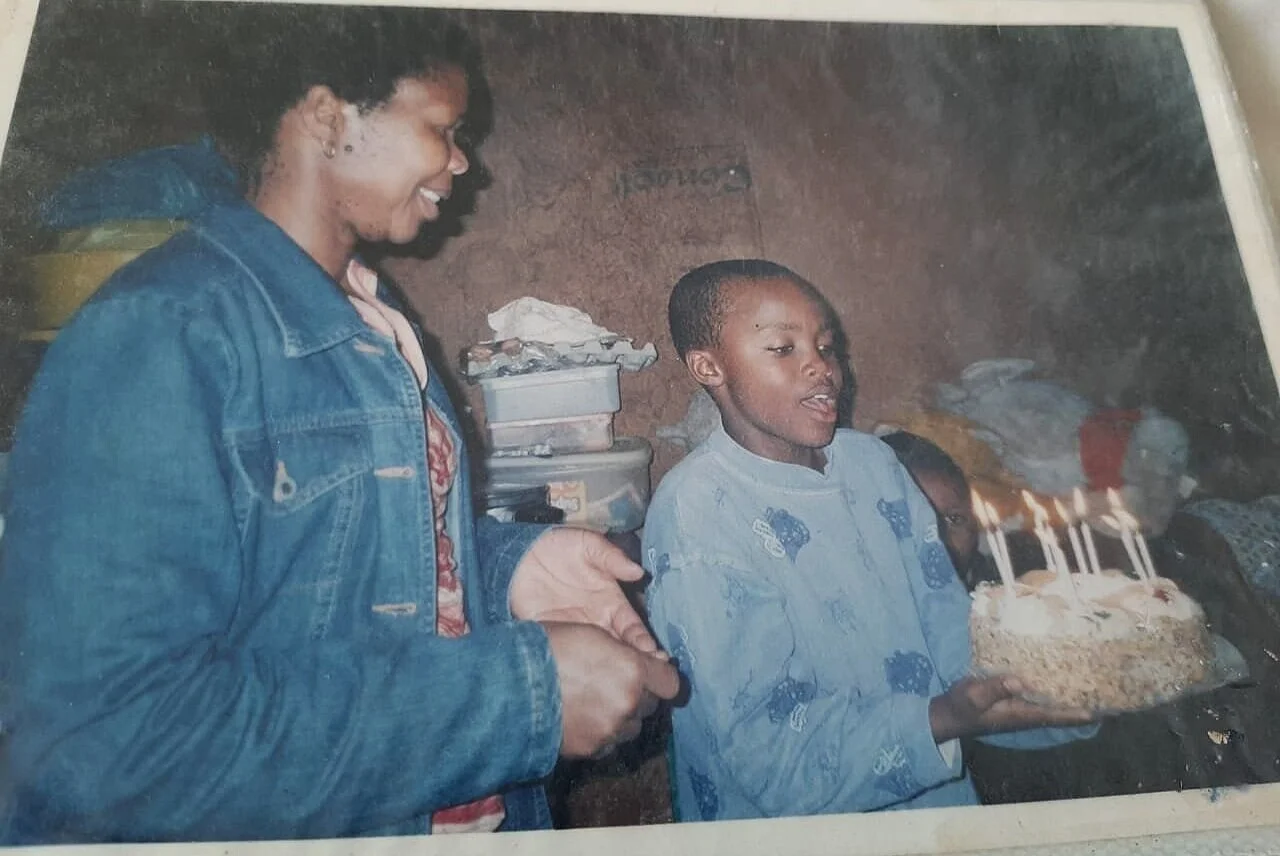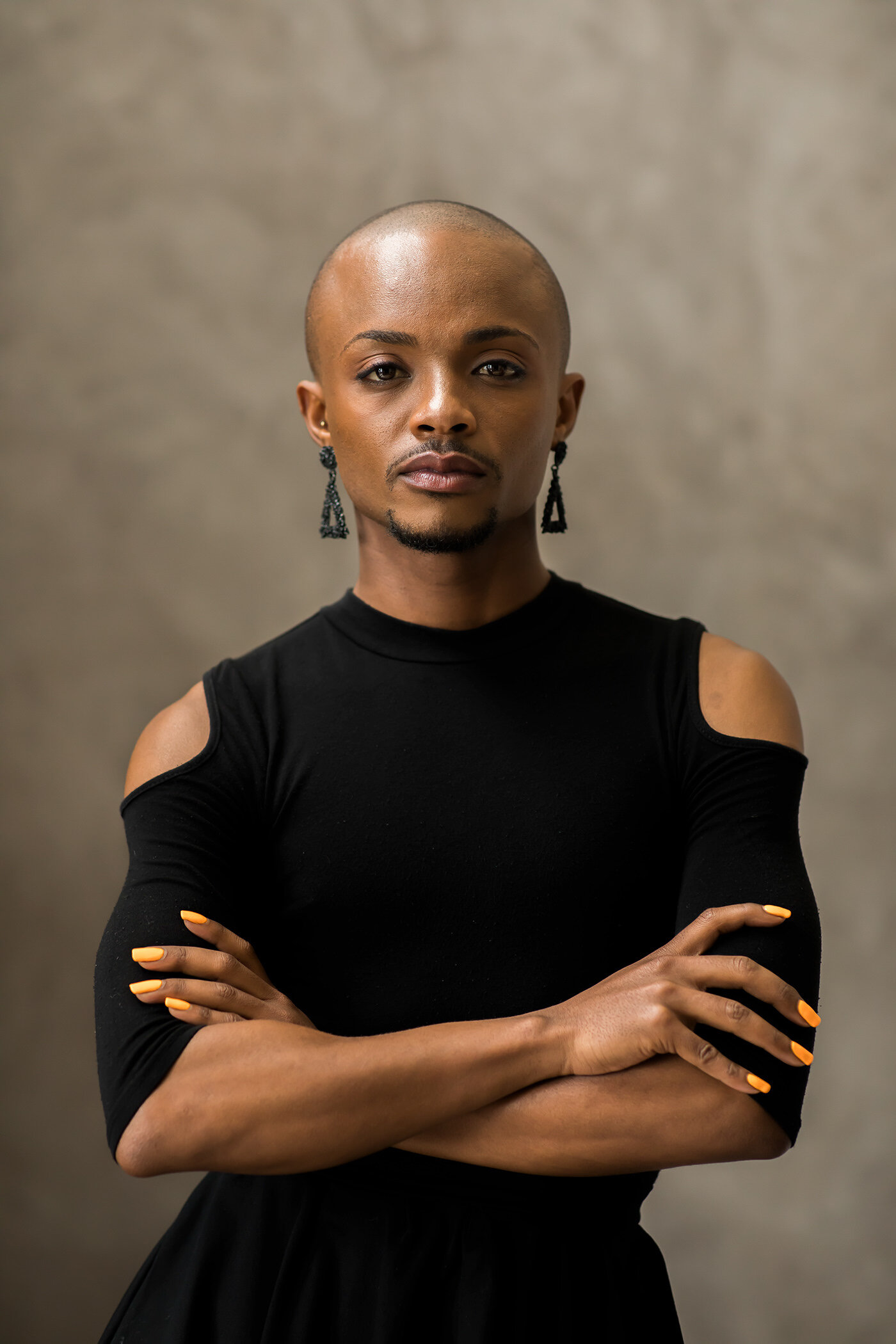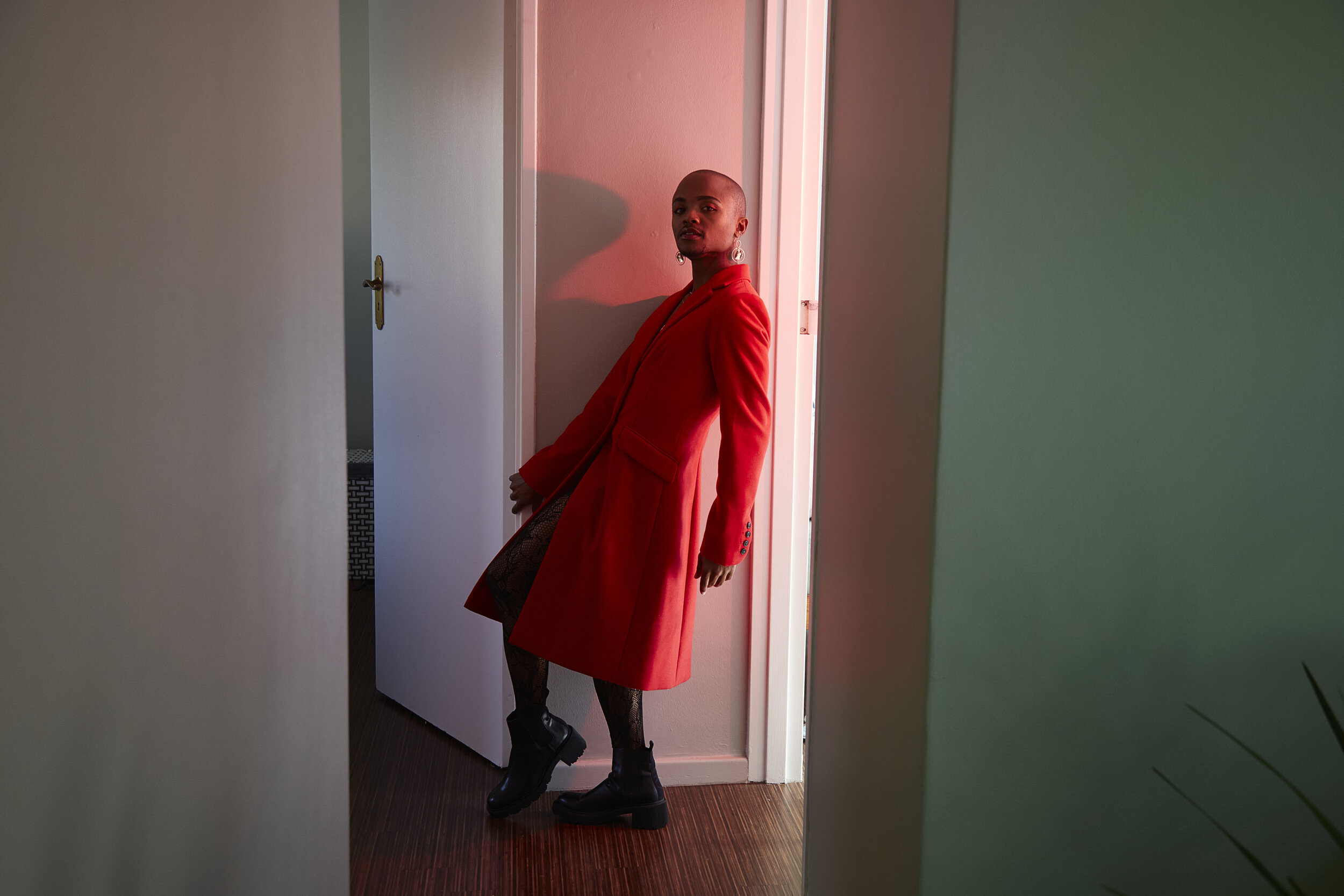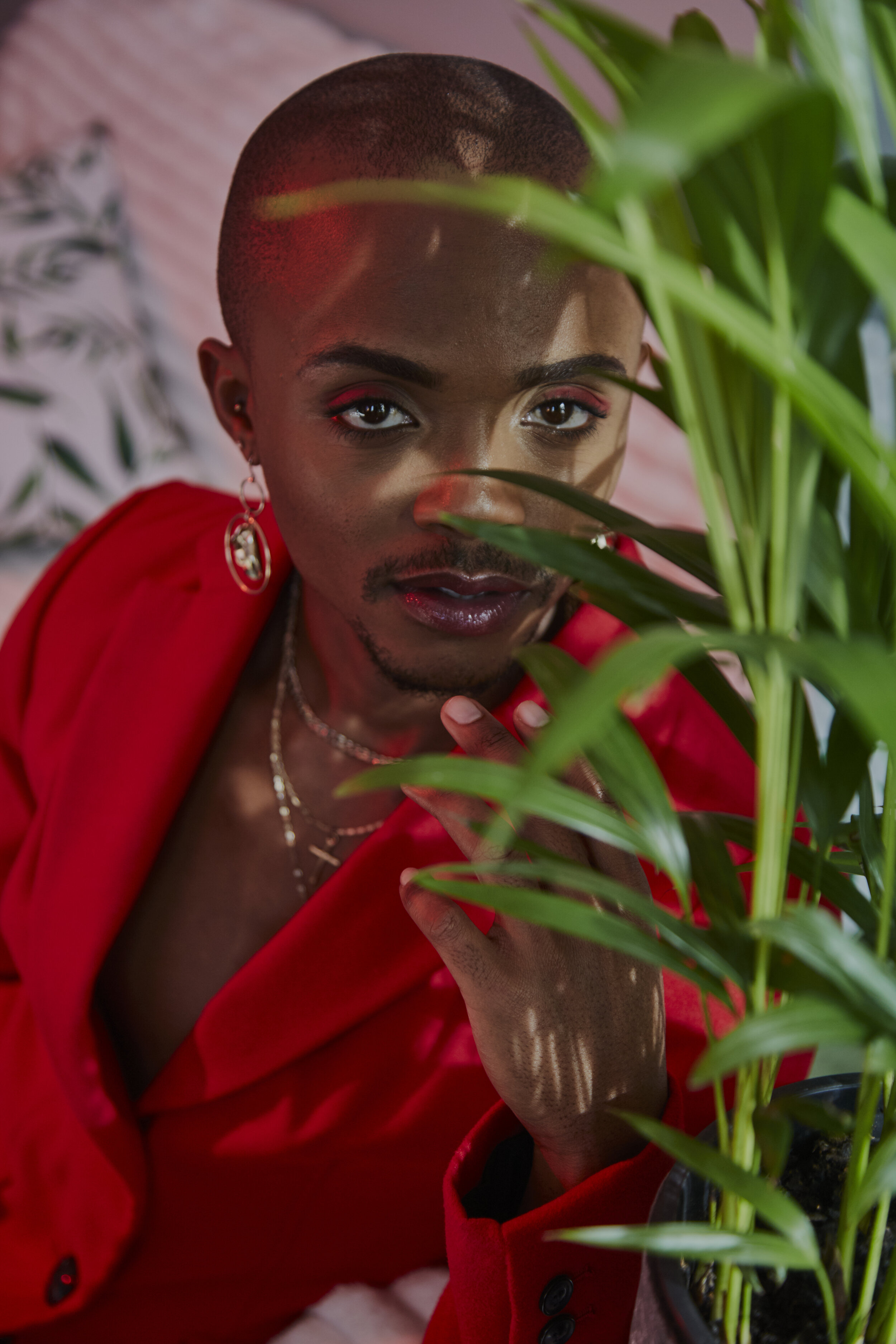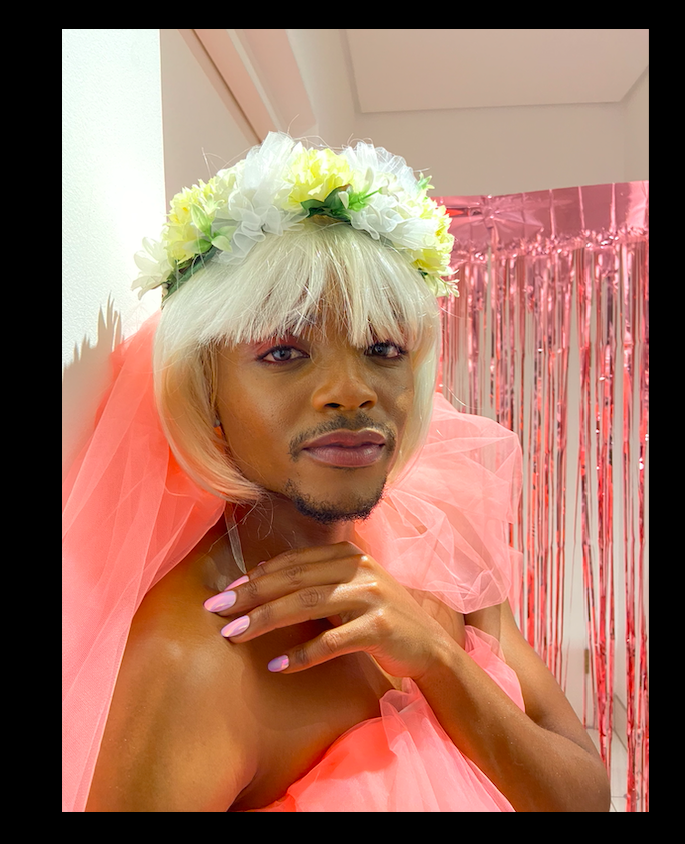“Representation is a doing word, we have to all do it so that we don’t run the risk of having a dominant semiotic (meaning making) of queerness.”- Tandile Mbatsha
Tandile Mbatsha
Choreo-Activist / Performance Artist / Educator
Pronouns: They/Them/ Theirs
Talking about my early childhood always makes me smile. I was born 15 March 1993 in kwa Langa. I was brought up by a unit of Black women; my granny uMamkwayi, my mother Nontuthuzelo Mrawu-Mbatsha and my aunts. They all exuded such grace, power in their daily mobility, speech and being. Mamkwayi always looked chic in her berets that matched her outfits. Her collection of brooches added a touch of elegance whether she was going to clean Mr. Kelly’s house, church or the funeral society. My mother, a direct manifestation of makhulu’s style. uMama wears leather, head to toe on any given day during Cape Town’s windy winter day. These are the women that brought me up before my parents got married.
You’ve spoken about realising you were queer from an early age when people starting noticing you “hiding” something. What can you share about those experiences?
The thing about being Queer is that society identifies you before you are even able to articulate and reconcile what you’re feeling inside. And further frames queerness in what Lwando Scott describes “as a lack, a loss, a deficiency, a state of being that needed alteration”. Which then presupposes that there’s something to disclose in the case that one is Queer. Heteronormativity then feels entitled to an explanation otherwise said group are disappointed and feel betrayed. Coming-out reinforces the assumption that there’s something to hide and said Queer person has a responsibility to come out. And that presupposes that said group of people may have an issue with what is to be disclosed. That their feelings matter more than that of the Queer person. Who are we centralising when we come out?
“Coming-out reinforces the assumption that there’s something to hide and said Queer person has a responsibility to come out. ”
It’s not uncommon for queer children try to be as invisible as possible to certain spaces, such as school and family gatherings. Did you find yourself minimising certain aspects of yourself?
It’s not unheard of. The biggest work I think we are collectively trying to do is trust our voices. The subjugation was layered for me, as a Black, Queer, small bodied person (especially as a ‘boy’ dancer). Undoing and unlearning those layers of conditioning; to power, grace and trust in our collective voices is where we’re at now.
Now, if I am not mistaken, there was a certain incident that cut your rugby career short in Grade 8…
[laughs] who sent you?!
Instead of tackling a person, I slapped them. It was my first rugby match even. I knew then that that’s not where I wanted to be. I took up first-aid and helped the boys with their injuries, you know.
How did attending the National School of Arts in Johannesburg shape your perspective on the possibility and validity of creating art?
My goodness where do I start? I was 15/16 years old. Moved to one of Africa’s premier cosmopolitan cities for the performing arts, nogal. Look, possibilities were endless...I was basically going to be a star [laughs]. But seriously, that’s the ethos the NSA fostered, I felt so validated culturally. There was vibrance in the air. I remember moving into the hostel on a Sunday evening, I seriously thought the kids here were stars. They exuded such confidence, all I kept thinking was i want to be like them. I’m going to be a star! [laughs]. uWoah there was space to dream BIG at NSA.
In one of your YouTube videos, your mother talks about fetching you from the airport upon your return from Johannesburg and having a conversation with you about your sexuality and identity. After “coming out” to her, you also asked her to do some of her own research about queer people. What did it mean to you to have a parent who was willing to educate themselves in that way?
To uMama it was fundamentally about parenting, it still is. My Mother has a very hands-on parenting style. She dislikes not knowing what is happening in our lives. uMama is very inspired by her father’s parenting skills, my grandfather was apparently a very respected and involved community man and had his house affairs intact. Having a hands-on parent meant I had to be forthcoming about any and every stage of my development.
“Having a hands-on parent meant I had to be forthcoming about any and every stage of my development. ”
You call your work “choreo-activism”, which immediately contextualises dance/movement as the language with which you make statements about various socio-political issues. Why is using your body in this way important to you?
My body is the site where I experience these socio-political issues, it is the medium I’ve experienced injustices and prejudice. For me it is only right that I use my body to illuminate these injustices and most importantly for me to unlearn I need to embody unlearning, I learn better kinesthetically, nje.
Your pop-up protest piece Intyatyambo Iyaphuma Engxondorheni, which loosely translates as “a flower blooming in arid land”, not only addressed the rampant and ongoing bigotry and violence towards the queer community in South Africa, it’s also a call for the rest of Africa to unite on queer rights, right?
Firstly, Africa needs to unite now more than ever. I dream of a United States of Africa. There’s so much we can do for each other, especially in this regard. If we could become one country gay rights could be standardised. Or better yet the African countries that have gay rights, have them pressure those that are lagging behind. Phela, this is a human rights issue, much like apartheid. But African leaders are too busy looting state funds to see to these issues. We need to treat gender-based violence and hate crimes as a separate offence so that we can see the reality of this pandemic that is femicide.
“We need to treat gender-based violence and hate crimes as a separate offence so that we can see the reality of this pandemic that is femicide. ”
There are people who think the arts should purely be used for the purposes of entertainment and not to make political statements- what is your response to that?
There is space for everything and everyone. Art plays a huge role in our collective consciousness as society. The world would not have known the extent and impact of apartheid if it was not for artists such as mam’Miriam Makeba and bab’Hugh Masekela.
You’ve also collaborated with the likes of Zanele Muholi for an exhibition in New York and Zoe Modiga for AfroPunk 2019- what excited you the most about merging your creativity and point of view with another artist’s?
I see collaborations as a crucible for creativity, a learning space for artists, especially solo artists to perhaps learn another discipline. When there’s enough time and resources they are really great and I'm grateful I've lived to experience them.
Your most recent work, THE SOLO BALL, which premiere at the 2020 National Arts Festival invited other queer artist to interpret your artisic motif of the flower blooming through infertile land- what was the thinking behind that?
I wanted to occupy space on the main program of the National Arts Festival and create space for queer subject matter by hosting a Ballroom and a couple of spaces to chat about queerness in Makhanda. COVID-19 happened and lockdown, subsequently. We had to rethink and reconceptualise. In keeping with the main objective “creating space” we thought let’s feature 4 other Queer Black bodies from different geographic locations. The bodies had to represent the spectrum of the LGBTIQ+. We looked at home as a micro organism of society...looking at how our homes can be unwelcoming to our Queerness. That’s how The Solo Ball was conceived.
Aside from being a performance artist, you are also a teacher, and as part of your PGCE research you receive pushback for wanting to include a queer reading into the curriculum- how did you navigate that and what do you think that says about the gaps in our education in general?
Oh my goodness, what an ordeal. 2018 was a very tough year for me: I was self- harming at some point due to the push back from staff members at the schools i was doing teaching practice at. That experience taught me that I have to fight, nje, to get anything. It taught me to fight [laughs]. My argument is and will always be, the curriculum needs to reflect each and every learner. If we are teaching learners about different cultures in grades 4 & 5 in Life Skills, why is queer culture not a part of it? We need to see ourselves in the curriculum. For example, the dance curriculum teaches port de bra (carriage of the arms), but voguing and whacking is a carriage of the arms, why not use that as a medium to teach port de bra? The gaps are there, I've seen them. I can go as far as saying the curriculum is homophobic as it stands now because it completely obliterates queer culture. And ke that time we have learners of the spectrum in our classroom, when are we (teachers + curriculum) affirming their existence?
In an interview with Unlabelled, you said: “Every day I show up, out of my living space, I'm very conscious of how I present myself and how others see me, and most importantly how this will impact the experience of another Queer”. Has this statement evolved in any way?
Visibility for queer bodies is a double-edged sword, on the one hand representation matters so that other can see themselves on the other our lives are at risk also. Representation is a doing word, we have to all do it so that we don’t run the risk of having a dominant semiotic (meaning making) of queerness. Especially when it is part of a broader movement for social change, do it.
And finally, how do you envision your legacy?
One of positivity, love, compassion and rigour. Rigorously do you, love you. And ultimately, when my day comes to return to my forefathers, I need to have built some archive for other queer bodies to see and make of themselves; and most importantly, critique and reimagine more ways of being.

